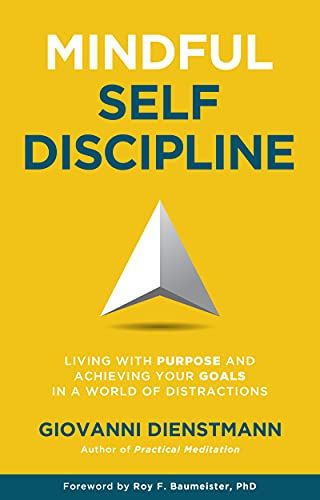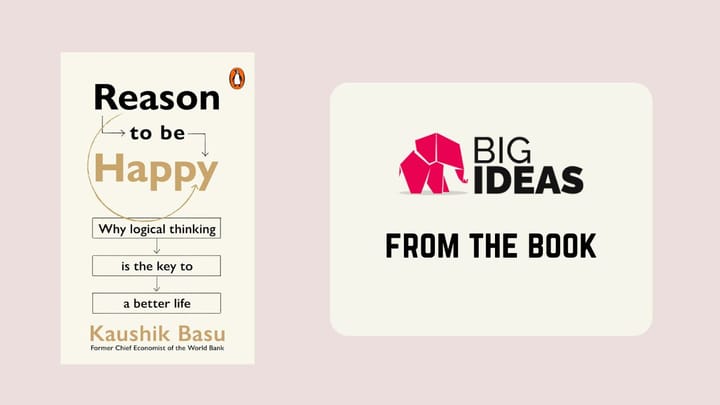Mindful Self-Discipline: Living with Purpose and Achieving Your Goals in a World of Distractions – Giovanni Dienstmann

Some people mistakenly believe self-discipline encourages self-shaming or imposes unwelcome restrictions on their lives. Meditation teacher and coach Giovanni Dienstmann aims to counter these misconceptions by extolling the virtues of mindful self-discipline. He argues that cultivating self-discipline improves your focus and well-being and gives you the personal power you need to achieve your goals. Dienstmann’s comprehensive three-pillar approach helps you uncover your true aspirations, gain self-awareness, overcome obstacles, and start your journey.
Key Take-Aways
- Use the power of self-discipline to journey toward your goals without fear, doubt or distraction.
- Cultivate your aspirations by discovering your purpose – the “why” behind your goals.
- Once you realize your true aspirations, establish the “how” of achieving your goals by building self-awareness.
- Advance your aspirations with decisive action.
- Implement self-discipline in your daily life by integrating your activity with your aspirations and values.
- Use the power of self-discipline to journey toward your goals without fear, doubt or distraction.
- Self-discipline embodies more than just good habits, organizational prowess or time management proficiency; it is an essential life skill. Self-disciplined people possess the ability to find happiness and live a fully engaged life.
Establish The How
Once you realize your true aspirations, establish the “how” of achieving your goals by building self-awareness.
Building self-awareness helps you establish how to move forward on your desired journey. Being self-aware provides you with the ability to choose. For example, if you want a healthy lifestyle but recognize that you love junk food, your awareness gives you the willpower to choose aspiration over temptation.
Three Methods To Build Self-Awareness
Practice three methods daily to help yourself build self-awareness and stay on track with your aspirations:
Meditate at the start of your day to spark your awareness and clearly see what you need to do.
Reflect—by journaling or tracking—at the end of each day to bring perspective and focus on how you aligned your emotions and your choices with your goals.
Integrate your aspirations throughout the day with activity.
The PAW method—Pause, Awareness, Willpower—is an essential practice to help you fight impulses and distractions. It encourages you to stop and reflect before taking action.
Effective Habits
Effective habits are both specific and enjoyable.
Specific habits describe the what, when, and where of your activity. For example, if you set a goal to write a book, establish a habit not just to write every day but to write a certain number of pages after dinner in your office.
If you don’t enjoy the habits you set, you will likely abandon your commitment. Find a process you enjoy or can learn to enjoy.
To form habits, create effective cues that will prompt you to action. You likely already unconsciously respond to cues today. When your phone dings, for example, you pick it up. The smell of coffee prompts you to crave a cup. Cues also encourage negative habits.
The Benefits
Consider the benefits you gain with self-discipline:
- The ability to work through distractions and focus on activities that align with your goals.
- The ability to break your bad habits and develop good ones.
- Improved relationships with family and friends.
The three pillars of mindful self-discipline focus on the “why” (y0ur purpose), the “how” (your awareness) and the “what” (your actions):
- Discover your “why” by probing your true aspirations.
- Establish your “how” by building self-awareness.
- Plan your “what” and call yourself to action.
Cultivate your aspirations by discovering your purpose – the “why” behind your goals.
Time Is Crucial
Managing your time wisely ensures your daily activities align with your aspirations. Successful time management, which mirrors the pillars of self-discipline, includes time prioritization and time awareness. Key elements include the following:
- Planning, which allows you to determine priorities and ensures you carry out your intentions.
- Setting boundaries by establishing what you will and will not do.
- Engaging time awareness to protect your schedule from getting off track.
- Focusing on your priorities and rebuffing distractions.
The Seven Steps
Start with your goals in mind, then take these seven steps to clarify your true aspiration:
- “Find your purpose” – Examine your core values and what you truly care about. Think about what inspires you the most, consider experiences where you felt your best or how you choose to spend your free time and money. Analyze a current goal and examine why you want to achieve it.
- “Magnify your purpose” – Measure the effects of both fulfilling or disregarding your aspirations in various areas of your life. Consider your family, your wealth, your career and your health.
- “Specify your purpose” – Further evaluate your aspirations with both quantitative and qualitative measures and create effective goals based on those measures.
- “Prioritize your purpose” – Measure your goals against the resources you can commit – your time, money and energy. To truly follow through with your aspirations, you must give your goals the attention and time they need.
- “Resolve self-sabotage” – Recognize and resolve conflicting feelings you project toward your aspirations. For example, while you sincerely want to speak out more at work, part of you may fear judgment. Likewise, you may want to curtail your time spent on social media, but you fear missing out.
- “Cultivate your mind-set” – Take full ownership of your purpose and truly believe in your abilities to achieve. Trusting in yourself instills motivation and gives you the energy you need to grow.
- “Make your offering” – Decide what aspects of your personality hold you back and cause you to disconnect with your aspirations. For example, to increase your productivity, you need to stop sleeping late in the morning.
Plan Your Journey
Take these four steps to plan your journey:
- Select one aspiration and one of its SMART goals.
- Establish separate tasks or milestones.
- Set start and end dates.
- Repeat for each goal.
Once you establish your milestones, design habits to strengthen your commitment. Your milestones may require action habits, such as writing in a journal or committing to daily meditation, or replacement habits that require you to introduce a new habit to replace a harmful one.
Meditation
Meditation offers a superior method of awareness training and serves as a solid foundation upon which to build mindful self-discipline. Meditation also benefits your overall health and well-being. Several types of meditation exist, but all involve relaxation, focus, and awareness. If you find one style of meditation decreases your passion and drive, try another method.
Mindful Self-Discipline
Through mindful self-discipline, you enhance your virtues, or personal strengths – such as patience, courage, confidence, and resilience – which you can then use to navigate everyday challenges. These virtues also boost your well-being. Make sure you balance your strengths to prevent them from becoming liabilities:
- Balance accountability with letting go to prevent being too hard on yourself.
- Balance self-belief with humility to prevent arrogance or recklessness.
- Balance perseverance with acceptance to avoid staying with something long after it loses its usefulness.
- When you develop mindful self-discipline, you give yourself the power to understand your true aspirations and set yourself on a journey to accomplish anything you want to achieve.
Awareness
Awareness gives you the freedom to choose how to respond to life as it happens, thus helping you live in alignment with your goals and values.
Awareness also means you refrain from shaming yourself if you falter, since that invites a cycle of emotional stress and negativity. Choose instead to forgive yourself and recommit to your goal.
Pause
When you pause, you slow down and consciously think before acting on impulses—for example, when you encounter a conflict with your aspirations, such as eating junk food or smoking.
Pausing provides you with the time and space to become aware of your choices. Do the available actions take you nearer to or further from your goals? For example, you hit the snooze button (further), eat a healthy lunch (nearer), and stop at the gym after work (nearer). Tally your score at the end of the day to see how well your choices reflect your intentions.
Use Willpower
Finally, use willpower, if needed, to intentionally shift your actions.
Apply the PAW method to overcome daily life’s obstacles, such as idleness, diversions and rationalizations. Pause and gain perspective by looking at your long-term goals. Connect emotionally to the version of yourself who follows through – who accepts temporary discomfort today in exchange for long-term success.
Advance your aspirations with decisive action.
Action requires effort and planning. Without a plan, you will be unlikely to move forward. Planning also uncovers how much effort it requires to advance your aspirations.



Comments ()